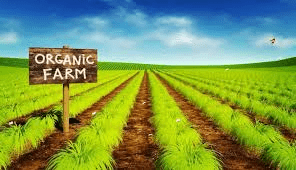One of the primary benefits of organic agriculture is its positive effect on environmental health. Organic farming practices avoid synthetic pesticides and fertilizers, reducing the risk of chemical runoff into water sources, which can harm aquatic ecosystems. Instead, organic methods focus on natural processes, such as composting and crop rotation, to maintain soil fertility and reduce pollution.
This approach helps protect biodiversity by creating habitats for beneficial insects, birds, and other wildlife. Organic farms also emphasize soil health, which improves soil structure, enhances water retention, and reduces erosion.
Health benefits are another significant advantage of organic agriculture. Organic foods are grown without synthetic pesticides, herbicides, or genetically modified organisms (GMOs), which may be linked to health concerns. By avoiding these chemicals, organic farming reduces the risk of pesticide residues in food.
Additionally, some studies suggest that organic produce may have higher levels of certain nutrients and antioxidants, contributing to better overall health. Organic livestock is raised without antibiotics or growth hormones, leading to healthier animal products and reducing the risk of antibiotic resistance.
Economic benefits are also noteworthy. Organic agriculture can support local economies by creating jobs in farming, processing, and retail. Organic farms often sell directly to consumers through farmers’ markets, community-supported agriculture (CSA) programs, and local stores, which can provide better prices for farmers and strengthen local food systems. Additionally, organic farming can be more resilient to market fluctuations and climatic stresses due to its emphasis on soil health and diverse farming systems.
Organic farming promotes sustainable agricultural practices that can help combat climate change. By enhancing soil carbon sequestration, organic farms can capture and store carbon dioxide from the atmosphere, mitigating greenhouse gas emissions. Practices like cover cropping and reduced tillage also contribute to carbon storage and improve soil health.
Social benefits include improved animal welfare and the support of rural communities. Organic farming standards require that animals have access to outdoor spaces and are raised in conditions that promote their well-being. This focus on humane treatment contrasts with some conventional farming practices that may prioritize production over animal welfare.
Additionally, organic farming can strengthen rural communities by encouraging local food production and reducing reliance on large-scale industrial agriculture.
Lastly, organic agriculture fosters a connection between consumers and their food sources. By supporting organic farms, consumers contribute to more environmentally and socially responsible food systems. This connection can lead to increased awareness about food production practices and a greater appreciation for the value of sustainable agriculture.
Organic agriculture benefits the environment, public health, and local economies. It promotes sustainable practices, enhances soil and water health, supports animal welfare, and offers potential health benefits through reduced chemical exposure and possibly higher nutrient levels. By encouraging a more sustainable and humane approach to farming, organic agriculture contributes positively to both people and the planet.
Organic Agriculture Benefits and Importance
1. Environmental Benefits

1. Soil Health: Organic farming methods, such as crop rotation, cover cropping, and the use of organic compost, enhance soil structure, fertility, and microbial activity. These practices prevent soil erosion and degradation, ensuring long-term agricultural productivity.
2. Water Conservation: Organic farming reduces water pollution by avoiding synthetic fertilizers and pesticides that can contaminate water sources. Techniques like mulching and organic mulch reduce water evaporation, promoting efficient water use.
3. Lower Carbon Footprint: Organic agriculture typically requires less energy compared to conventional farming, reducing greenhouse gas emissions. Practices like reduced tillage and using organic inputs further contribute to carbon sequestration in the soil.
4. Ecosystem Preservation: Organic farms often serve as refuges for wildlife, supporting diverse ecosystems. By avoiding harmful chemicals, organic farming helps maintain habitats for beneficial insects, birds, and other wildlife.
2. Health Benefits for Consumers
1. Reduced Chemical Exposure: Organic produce is free from synthetic pesticides, herbicides, and fertilizers, reducing consumers’ exposure to potentially harmful chemicals. This is particularly beneficial for children and pregnant women, who are more vulnerable to pesticide residues.
2. Higher Nutritional Value: Some studies suggest that organic foods may have higher levels of certain nutrients, including antioxidants, vitamins, and minerals. The absence of synthetic additives and preservatives also means cleaner, more wholesome food.
3. No GMOs: Organic farming prohibits the use of genetically modified organisms (GMOs). For consumers concerned about the potential long-term health effects of GMOs, organic food provides a safer alternative.
4. Improved Taste and Quality: Many consumers report that organic fruits and vegetables have better flavor and texture. This is often attributed to the natural growing conditions and slower growth rates of organic crops.
3. Improved Soil Quality
1. Enhanced Soil Structure: Organic practices like composting and the use of green manure improve soil structure, making it more porous and enhancing its ability to retain water and nutrients.
2. Increased Organic Matter: Adding organic matter to the soil through compost and crop residues boosts soil fertility and supports a healthy soil ecosystem. This organic matter acts as a reservoir of nutrients that plants can access over time.
3. Microbial Diversity: Organic soils tend to have higher microbial diversity, which plays a crucial role in nutrient cycling and disease suppression. Healthy soil microbes also help plants withstand stress from pests and diseases.
4. Reduced Soil Erosion: Techniques like cover cropping and reduced tillage protect soil from erosion by maintaining ground cover and improving soil structure. This preserves topsoil, which is essential for productive farming.
4. Biodiversity Enhancement
1. Pollinator Support: Organic farms provide habitats for pollinators like bees and butterflies, essential for the pollination of many crops. The absence of harmful pesticides ensures a safer environment for these vital insects.
2. Natural Pest Control: By promoting a diverse ecosystem, organic farms encourage the presence of natural predators that help control pest populations. This reduces the need for chemical interventions and supports ecological balance.
3. Diverse Crop Varieties: Organic farming often involves growing a wide variety of crops, which enhances biodiversity on the farm. This diversity can make farms more resilient to pests, diseases, and changing climate conditions.
4. Wildlife Habitats: Organic farms often include features like hedgerows, ponds, and uncultivated areas that provide habitats for wildlife. This biodiversity benefits the environment and supports ecosystem services like pest control and pollination.
5. Economic Benefits for Farmers
1. Premium Prices: Organic products typically fetch higher prices in the market due to their perceived health and environmental benefits. This price premium can help offset the higher costs associated with organic farming practices.
2. Reduced Input Costs: By avoiding synthetic chemicals and using on-farm resources like compost, organic farmers can reduce input costs. Savings on fertilizers and pesticides can improve overall farm profitability.
3. Market Opportunities: The growing demand for organic products creates new market opportunities for farmers. Farmers can sell directly to consumers through farmers’ markets, CSAs (Community Supported Agriculture), and online platforms.
4. Long-term Sustainability: Organic farming practices enhance soil health and fertility, ensuring long-term productivity and sustainability of the farm. This reduces the risk of soil degradation and dependence on external inputs.
6. Reduced Chemical Usage
1. Environmental Protection: Avoiding synthetic pesticides and fertilizers reduces the risk of water and soil pollution. This protects aquatic ecosystems and groundwater quality, preserving natural resources.
2. Healthier Farm Environment: Reduced chemical usage creates a safer working environment for farmers and farm workers. Exposure to harmful chemicals can lead to health issues, so organic farming practices contribute to better health and safety.
3. Lower Residue Levels: Organic produce has lower pesticide residue levels, making it safer for consumers. This aligns with the growing consumer preference for clean, chemical-free food.
4. Enhanced Soil and Water Quality: Reduced reliance on chemicals helps maintain healthy soil and water systems. This fosters a sustainable agricultural system that benefits both the environment and society.
Read Also: Swine Processing and Marketing
7. Economic Benefits

1. Market Growth and Opportunities
The organic agriculture sector has experienced significant growth in recent years, driven by increasing consumer demand for organic products. This growth creates economic opportunities for farmers, processors, and retailers. Organic farming can also open new markets and provide premium prices for products, benefiting farmers financially.
2. Sustainable Farming Practices
Organic agriculture promotes sustainable farming practices that can lead to long-term economic benefits. By focusing on soil health, reducing reliance on external inputs, and enhancing biodiversity, organic farms can reduce their production costs and improve resilience to environmental stresses. This sustainability can contribute to the economic viability of farming operations over time.
3. Support for Local Economies
Organic farming often emphasizes local food systems, including farmers’ markets, community-supported agriculture (CSA) programs, and local food cooperatives. By supporting local food systems, organic agriculture contributes to the economic vitality of rural communities and strengthens local economies.
Read Also: Uses of Pig Meat and Pig Marketing
8. Biodiversity and Ecosystem Benefits

1. Habitat for Wildlife
Organic farms provide important habitats for a wide range of wildlife. The use of diverse crop rotations, cover crops, and reduced chemical inputs creates environments where beneficial insects, birds, and other animals can thrive. This biodiversity supports ecosystem functions, such as pollination and pest control, which are essential for maintaining healthy agricultural systems.
2. Pollinator Support
Organic farms often support healthy populations of pollinators, such as bees and butterflies, by providing diverse flowering plants and minimizing pesticide use. Pollinators play a crucial role in the production of many crops, and their health is essential for ensuring food security and ecosystem stability.
3. Water Conservation
Organic farming practices contribute to water conservation by improving soil structure and reducing runoff. Healthy soils with high organic matter content have better water-holding capacity, which reduces the need for irrigation and helps prevent soil erosion. This water conservation is beneficial for both agricultural and natural ecosystems.
Challenges and Considerations
While organic agriculture offers numerous benefits, it also faces certain challenges. Organic farming can require more labor and management compared to conventional methods, and yields may be lower in some cases. Additionally, organic certification processes can be complex and costly for farmers.
Despite these challenges, the long-term benefits of organic agriculture such as improved environmental health, enhanced biodiversity, and reduced chemical exposure, make it a valuable approach to sustainable farming. Continued research, innovation, and support for organic practices can help address these challenges and further advance the benefits of organic agriculture.
In conclusion, organic agriculture provides a wide range of benefits, from environmental and health advantages to economic opportunities and biodiversity support. By emphasizing natural processes, reducing chemical inputs, and fostering healthy ecosystems, organic farming contributes to a more sustainable and resilient food system.
As consumer demand for organic products continues to grow, the positive impacts of organic agriculture are likely to expand, supporting the well-being of both people and the planet.
Read Also: How to Become a Teacher
Frequently Asked Questions
We will update this section soon.

